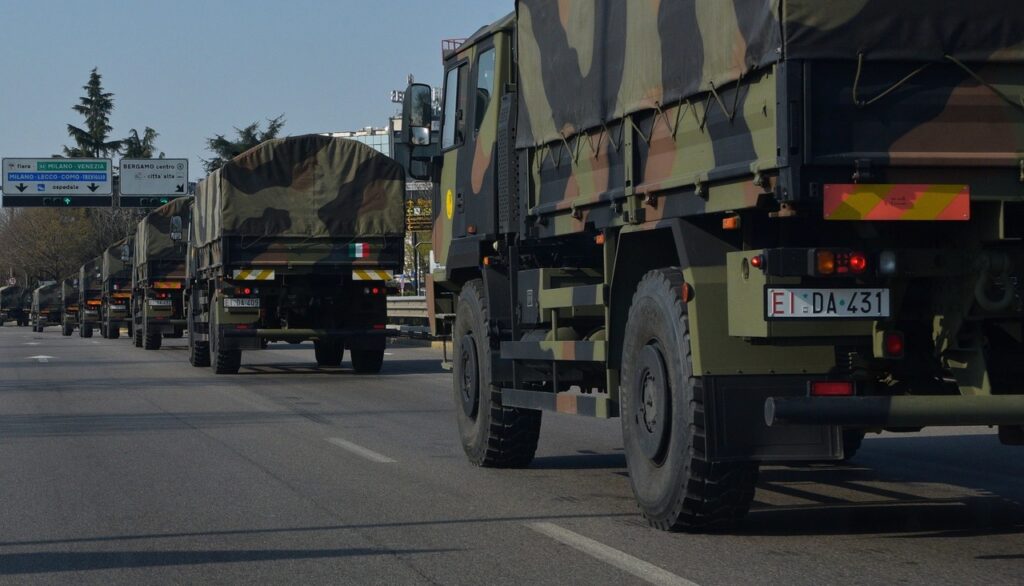Last updated on April 7th, 2020 at 09:11 am
Hollywood stars are sharing the video of John Lennon’s song Imagine, but now is not the time to double down on the silly songs, degenerate culture, egoism and madness that have brought the Covid-19 crisis upon us. They put their hope in an imagined invincibility or immortality, in globalism… in nothing. But this is not real hope, and it doesn’t encourage us. This tragedy is not “imagined,” but real: the numbers prove it.
Here in Lombardy—the place where St. Ambrose and St. Charles Borromeo lived—we are people full of pragmatism and real hope. We don’t go in for silly songs like Imagine, but instead sing the Salve Regina and other prayers to God.
They aren’t just numbers: each number is a face, a story, an experience—a real person who was living and whom the virus has killed. Every one, mostly elderly people, had a family, was part of a network of people: friends, parents, children, grandchildren, work colleagues. None of them lived in John Lennon’s imaginary world, but the real world. Nonetheless, numbers are still important to understand this tragedy: nearly 4,500 deaths in Lombary alone (over 7,000 in Italy total), and over the whole country over 70,000 people infected.
The US, apart from Hollywood, has given help in these last days. In this dark period a light has turned on: not only have the Chinese, Russian, and Cuban governments sent doctors and medical equipment, but aid also came from the Christian charity run by Rev. Franklin Graham, Samaritan’s Purse. They airlifted in an Emergency Field Hospital and provided life-saving medical assistance and equipment to the city of Cremona, not far from Milan in the soutern part of Lombardy. A medical staff of 60 people and a 60-bed hospital with 8 intensive care units comprise this field hospital.
It is an unexpected ray of sun, but welcome and needed. We thank America, thank Samaritan’s Purse. What else can Christians do in this time but try to help others? This is happy news, an important sign of real ecumenism and fraternity. It is also distinct from the globalist solidarity excercised by the world’s NGOs. They press for support and donations to help all manner of poor people, but here in Lombardy and in Italy in general they are totally absent during this tragedy. ‘Emergency’, ‘Doctors Without Borders’, Amnesty International, Oxfam, CARE, and so many others: these haven’t provided medical staff or equipment—and the list of organizations could be much longer. Their “solidarity” may be strong with those who suffer far away, but it is weak in their own back yards. Do they discriminate? Is it because we are mostly white Europeans, Italian Catholics, that we don’t merit their help?
The major international philanthropists have done exactly the same as the NGOs: they support “humanity” and the “open society” but not a cent to help the emergency here in Italy. It leaves us speechless. The number of deaths take the breath away. The deaths are no less tragic beause of the fact that they are mostly old people: their loss impoverishes our families and communities, as we lose their venerable wisdom and experience. Yet even here in Lombardy the tragedy doesn’t seem to fully sink in: supermarkets are full of people in mad rushes to hoard, not from any real necessity but from a spirit of consumerism and selfishness.
On March 18 and during the subsequent days, the Italian army was called in to the province of Bergamo. A long line of military trucks transported coffins to the cemeteries and crematoriums of other cities. This is yet another compounding factor in this tragedy. People die alone, and then cannot even have a funeral, and then are buried far off from their home because local cemeteries are full.
Our faith strengthens us. On March 19, Pope Francis invited everyone to invoke the intercession of St. Joseph and pray the Rosary for the country and all the sick around the world. On March 25, he extended the invitation to all Christians to pray together the Lord’s Prayer at noon all around the world. And on Friday, March 27th, he is inviting all believers to tune in and pray together to receive a blessing for the world.
This is consoling as restrictions to movement in the country become more and more strict, making it nearly impossible to go to a Church and pray. On March 20th, I asked to a police officer who was patrolling the streets if I could go to the Church to pray the Stations of the Cross. “It is not necessary!” was his quick answer.
Yes, the common idea is that it isn’t “essential” to address our needs to God, our Savior. But for some of us it is. It was honorable of President Trump in America to declare Sunday, March 15 a National Day of Prayer, for example. It reminds us how important prayers are, to ask help from God just as our forebears did, in the US just as in Lombardy. This virus acts by taking one’s breath, suffocating and isolating the person: but this just reminds us that we take our breath for granted, when really every breath comes from God. But this only This virus takes breath away, suffocates and leaves you alone. It has been questioned by this tragedy; we are more and more aware that every breath depends on someone else, God.
I share with you in closing this ancient, short hymn from the time of the Black Death. This isn’t a song of “imagining”—it a real, a prayer for help to drive plague away. These songs from our ancestors are what we need, even if Hollywood finds no use for them.
